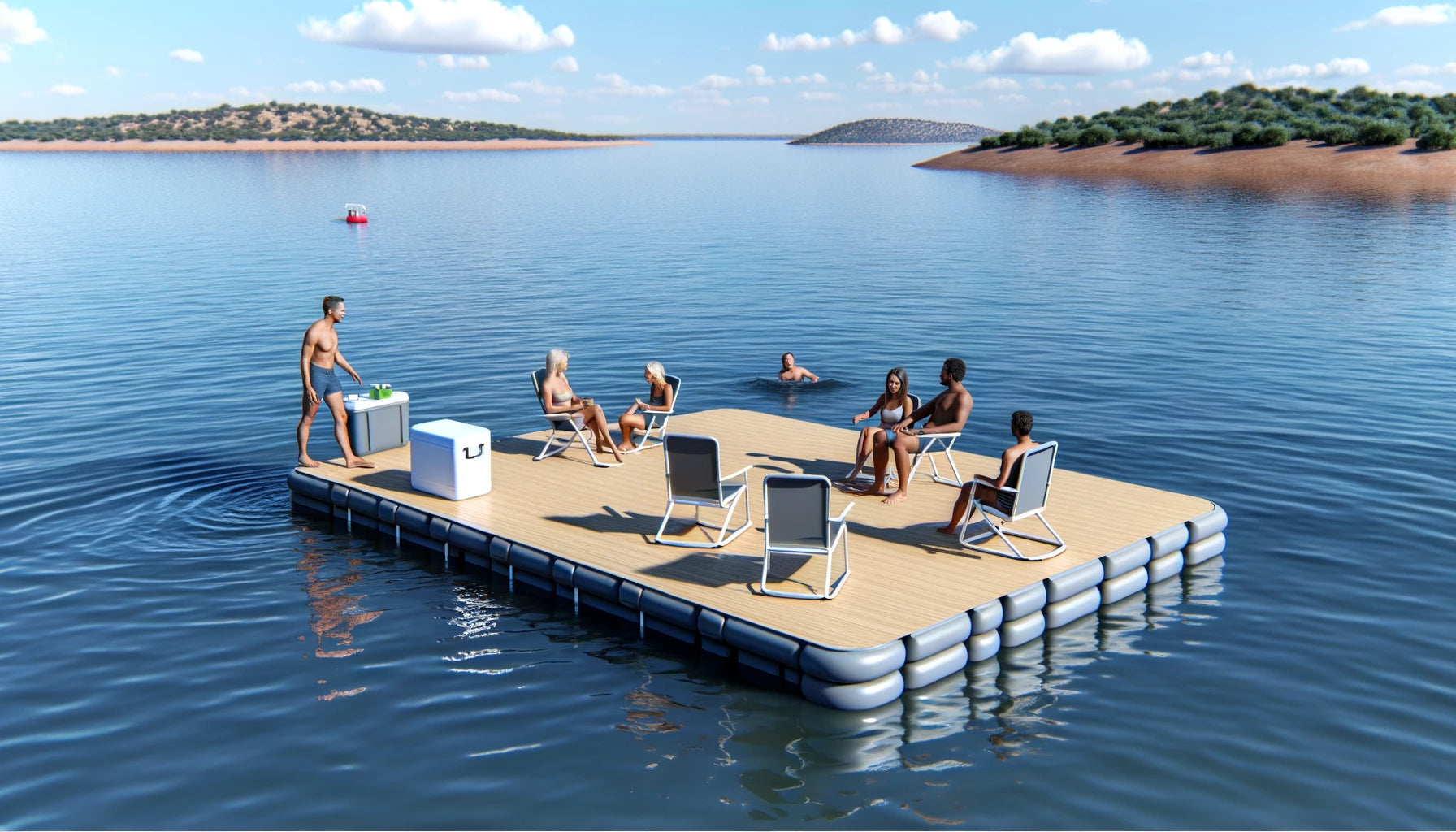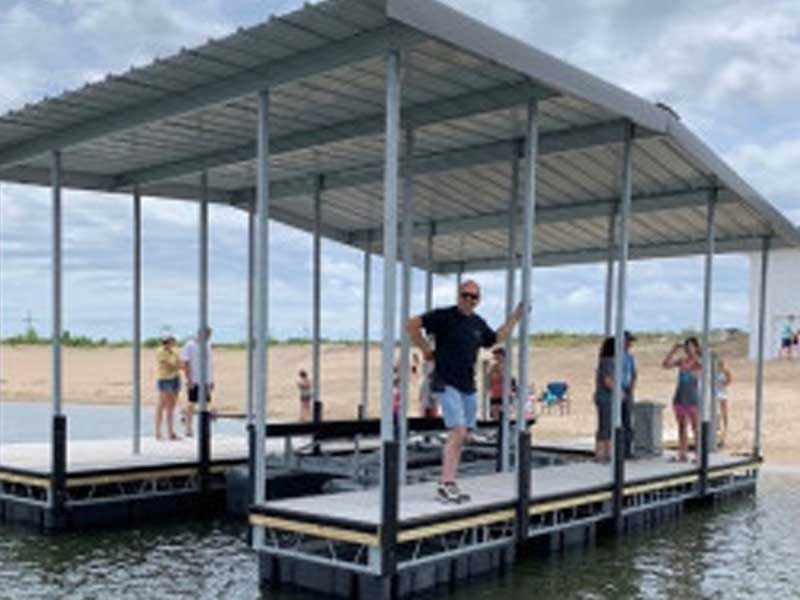Check out the Advantages of Picking a Floating Docks Solution for Your Beachfront Building
The Ultimate Overview to Selecting the most effective Floating Docks
Choosing the optimal floating dock needs an extensive understanding of various elements that affect both performance and long life. Aspects such as dock types, products, and important features significantly impact your decision-making procedure. Considerations around setup and spending plan can even more make complex the selection. By examining these elements systematically, one can make sure a financial investment that not only fulfills immediate requirements yet likewise boosts overall property value. As we discover these crucial elements, it becomes clear that the appropriate choices can result in a long-term and functional solution tailored to your certain demands.
Understanding Floating Dock Types
When choosing a drifting dock, it is necessary to understand the various types offered, as each serves unique functions and applications. Floating docks mostly drop right into 3 classifications: modular, fixed, and pontoon docks.
Modular docks are composed of private sections that can be quickly put together or reconfigured, making them suitable for altering water levels and diverse uses, such as business procedures or entertainment tasks. Their versatility allows for modification based on particular needs.

Pontoon docks are characterized by their resilient structure, commonly composed of numerous pontoons that provide security and assistance. They are especially well-suited for bigger vessels and are typically made use of in marinas or for waterfront buildings. Comprehending these kinds aids in picking the most ideal floating dock to satisfy details needs, making sure optimal performance and safety and security.
Secret Products for Resilience
Choosing the appropriate materials for floating docks dramatically effects their longevity and longevity. The most typical products consist of timber, plastic, metal, and composite products, each offering distinctive advantages and limitations.
Wood, commonly preferred for its visual allure, requires routine upkeep to hold up against dampness and degeneration. Pressure-treated lumber can boost resistance to rot, yet it might still be vulnerable to insects and weathering.

Plastic docks, constructed from high-density polyethylene (HDPE), are immune to deterioration, UV radiation, and effect, making them a prominent choice for seaside atmospheres. Their lightweight nature additionally assists in easy installment and relocation.
Steel docks, normally created from light weight aluminum or galvanized steel, supply extraordinary toughness and sturdiness. They are resistant to deterioration, specifically when treated, but may need additional insulation to avoid warm accumulation in warm climates.
Composite products, incorporating wood fibers and plastics, supply the benefits of both timber and plastic, resisting dampness and fading while requiring marginal maintenance. - dock company
Eventually, the choice of materials ought to line up with ecological conditions, meant usage, and maintenance choices to guarantee the floating dock remains practical and cosmetically pleasing gradually.
Vital Attributes to Consider
While the option of products is essential, thinking about essential functions for floating docks is just as important to guarantee optimum efficiency and user complete satisfaction. One crucial feature to analyze is the dock's buoyancy capacity, which figures out just how much weight it can sustain without submerging. floating dock services. This is check out this site vital for accommodating boats, individual watercraft, and even recreational activities
Furthermore, mobility is a substantial factor to consider. Relying on your requirements, you might desire a dock that is very easy to transport and disassemble, particularly if you plan to relocate it seasonally. Security is an additional essential feature; a well-designed floating dock needs to decrease activity brought on by wind and water currents, providing a safe system for individuals.
Safety and security functions, such as non-slip surface areas and rounded sides, are likewise important to protect against accidents, specifically in damp problems. Moreover, think about the accessibility of accessories, such as ladders, cleats, and bumpers, which can enhance the capability of your dock.
Installation and Maintenance Tips
Establishing and keeping a drifting dock requires mindful planning and attention to information to ensure its long life and optimum efficiency. Begin by picking an ideal place that reduces direct exposure to strong currents and waves, which can create wear and tear. Make certain that the water depth is sufficient for the dock's elevation which it is anchored firmly to avoid movement.
During installment, follow the supplier's guidelines carefully, as inappropriate assembly can endanger security. Use high-quality products immune to corrosion, such as light weight aluminum or treated wood, to boost sturdiness. Frequently inspect all elements, consisting of floats, ports, and securing systems, for indicators of damage or wear.
If your dock utilizes flotation devices, ensure they continue to be undamaged and cost-free from slits. By sticking to these setup and maintenance suggestions, you can take pleasure in a practical and reputable floating dock for years to come.
Budgeting for Your Dock
Budgeting for your dock is a vital step that can substantially affect your general contentment and financial investment in a waterside property. Developing a clear budget plan assists you navigate the numerous options available and guarantees you make notified decisions that straighten with your economic abilities.
Begin by identifying the dimension and style of the dock you require, as these variables will considerably affect the expense. Floating docks can vary dramatically in rate, relying on materials, buoyancy, and attributes like accessories and ramps. Study different suppliers and vendors to contrast prices and understand the marketplace value.
Along with initial prices, consider recurring costs such as upkeep, insurance policy, and possible repair work. Allocate funds for these persisting costs to prevent surprises down the line. It's additionally prudent to spending plan for any type of essential licenses or examinations, which may be needed by local policies.
Finally, remember the prospective roi. A well-planned dock can improve your residential property's value and charm, giving index a favorable financial effect in the long term. By budgeting efficiently, you can make certain that your dock meets your requirements without jeopardizing your economic security.
Final Thought
In verdict, picking the optimal floating dock demands a detailed evaluation of numerous aspects, including dock kinds, products, important features, and installment processes. Mindful factor to consider of budgetary restrictions will further make sure a sound financial investment.

While the option of products is essential, thinking about crucial features for floating docks is similarly crucial to make certain optimal performance and individual contentment.Establishing up and maintaining a floating dock requires cautious preparation and focus to information to ensure its longevity and ideal efficiency. Floating docks can differ substantially in rate, depending on materials, buoyancy, and functions dig this like ramps and devices.In verdict, picking the ideal floating dock demands a comprehensive examination of various variables, including dock types, materials, important functions, and setup processes.